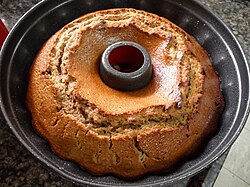Lekach
 | |
| Alternative names | Jewish honey cake |
|---|---|
| Type | Cake |
| Main ingredients | Cake base, Honey |
| Variations | Basbousa |
Lekach, or Jewish honey cake in English, is a honey-sweetened cake. It is one of the symbolically significant foods traditionally eaten by Ashkenazi Jews at the Jewish holiday of Rosh Hashanah, in hopes of ensuring a sweet New Year.[1]
Recipes vary widely. Lekach is usually a dense, loaf-shaped cake, but some versions are similar to sponge cake or pound cake, with the addition of honey and spices, sometimes with coffee or tea for coloring. Others versions are more like gingerbread, Pain_d'épices, or lebkuchen.[1]
The Jewish tradition of honeyed cakes may date back to basbousa (sometimes spelled basboosa), an ancient Egyptian cake,[1] variations of which are still enjoyed throughout the Middle East.
A very traditional honey cake from Austria contains an equal weight of white rye flour and dark honey, strong coffee instead of water, cloves, cinnamon, allspice, and golden raisins in the loaf, with slivered almonds on top of the loaf. Of course it also has a fair amount of eggs, vegetable oil (probably corn), salt, and baking powder.
See also
References
- ^ a b c Zeldes, Leah A. (September 16, 2009). "Eat this! Lekach: Jewish honey cake, for a sweet new year". Dining Chicago. Chicago's Restaurant & Entertainment Guide, Inc. Retrieved October 27, 2009.
